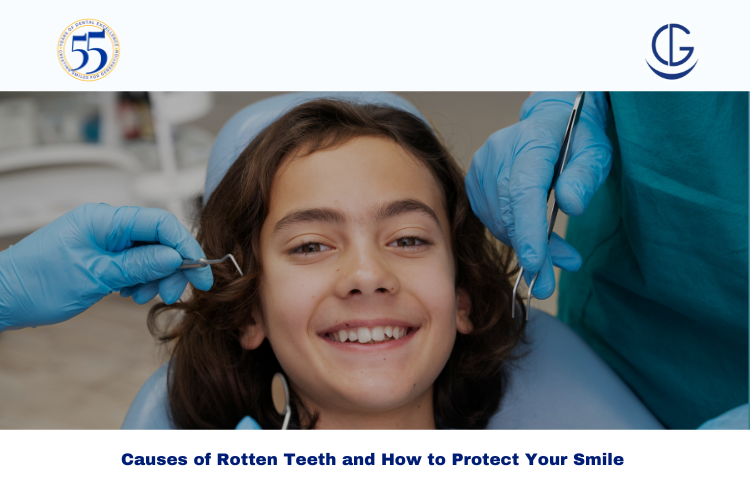Schedule Appointment



At Dr Gowds Dental Hospital in Hyderabad, we often see patients worried about rotten teeth — a frightening term but one that points to real oral health issues. In this post, we’ll break down what causes rotten teeth, how to avoid them, and when to see a professional. Whether you’re in Hyderabad looking for a dental hospital in Hyderabad or seeking advice from the best dentist, this guide is for you.
The phrase rotten teeth is not just about visual decay. It can mean tooth decay, cavities, infection, structural damage, and eventual tooth loss. Below we explain the causes, prevention strategies, and when to get help.
Before diving into causes and prevention, let’s clarify what people mean by rotten teeth:
When decay progresses without treatment, it gives the impression of a “rotten” tooth — discolored, weak, maybe smelling bad or hurting.
If you don’t brush and floss regularly (twice a day, with flossing at least once), plaque accumulates. Plaque harbors bacteria that produce acids that erode enamel and lead to cavities.
Frequent consumption of sugary foods, soft drinks, candies, sweets, or acidic foods (citrus, sodas, energy drinks) feeds decay-causing bacteria. The acids produced wear down enamel.
Fluoride helps remineralize and strengthen enamel. If your water supply is low in fluoride or you’re not using fluoridated toothpaste, your teeth are more vulnerable.
Saliva helps neutralize acids and wash away food debris. Conditions, medications, or dehydration that reduce saliva increase risk of decay.
Some teeth have natural grooves that are hard to clean. These recesses trap bacteria and food, becoming a hotspot for cavities.
Genetic factors, childhood illness, or poor nutrition during enamel formation can yield thinner or weaker enamel that is more liable to decay.
Constant snacking means your mouth never recovers; the pH stays low, and bacteria stay active.
Small cavities that go untreated worsen. A tiny spot can grow, reach the pulp, and lead to large structural damage.
Smoking, chewing tobacco, or using acidic substances can further damage gums, reduce blood flow, and harm enamel.
Cracks, chips, or broken fillings expose deeper parts of the tooth to bacteria, accelerating decay.
Watch for:
If you notice these, don’t wait too long — early intervention is much easier.
Prevention is better (and cheaper) than cure. Here’s a roadmap:
For children or adults with deep grooves, dentists can apply sealants to protect vulnerable surfaces.
Visit a dental hospital (or your local dentist) every 6 months (or as advised) to catch decay early and clean areas you can’t reach.
Stay hydrated, chew sugar-free gum (xylitol-based), avoid caffeine/alcohol, and talk to your dentist about remedies if medications are causing dry mouth.
Quit smoking or chewing tobacco. Don’t use teeth as tools (e.g., opening bottles).
If your dentist spots a cavity, get it filled or managed early before it becomes a “rotten tooth.”
Use mouthguards for contact sports to avoid fractures or trauma.
If decay has progressed deeply, no home-care alone will suffice. You should see a professional if:
In severe cases, root canal therapy, crowns, extraction, or implants may be required.
At Dr Gowds Dental Hospital, we believe in combining prevention with precise clinical care. Under the guidance of Prof. Dr. M.S. Gowd and his team, we:
It’s best not to let decay advance. If symptoms persist or worsen, don’t delay — consult a dental professional right away. A healthy, happy smile is worth the effort.
Rotten teeth begin when bacteria in plaque produce acids that erode enamel, leading to cavities, infection, and structural breakdown over time.
Very early enamel damage can sometimes be remineralized, but once there’s a cavity or pulp involvement, professional dental care is necessary.
Use a fluoride toothpaste, limit sugary foods, visit a dental hospital in Hyderabad (such as Dr Gowds Dental Hospital) for regular cleanings, and keep up good oral hygiene.
Yes—fillings, root canal therapy, and crowns can often repair damage